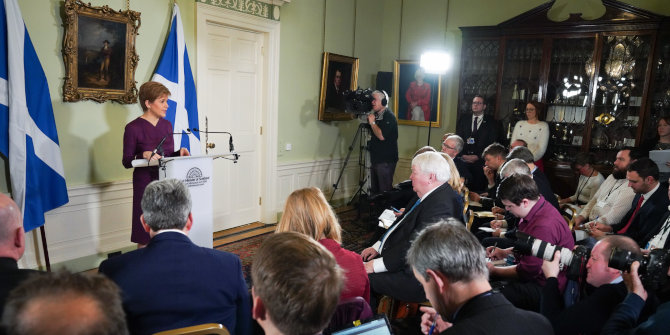 The much-anticipated Brexit impact assessments are rather less detailed than many expected them to be. Chris Kendall contrasts the Brexit secretary’s admission that he is ‘not a fan’ of them with the stringent approach the European Commission now takes to financial accountability. Indeed, it was the UK’s insistence on thorough impact assessments that helped to create a culture of propriety in Brussels.
The much-anticipated Brexit impact assessments are rather less detailed than many expected them to be. Chris Kendall contrasts the Brexit secretary’s admission that he is ‘not a fan’ of them with the stringent approach the European Commission now takes to financial accountability. Indeed, it was the UK’s insistence on thorough impact assessments that helped to create a culture of propriety in Brussels.
On 6 December 2017, David Davis, the Secretary of State for Exiting the European Union, told a House of Commons Select Committee that he is “not a fan” of impact assessments. To appreciate quite how shocking it is to hear this coming from the mouth of a senior British government minister, I’ll need to fill you in on some background.
As a fresh-faced graduate in the early 1990s, I joined the UK’s Department of Trade and Industry as a member of the newly-minted European Fast Stream, a programme designed to place more Brits in the Brussels institutions having first funnelled them through what Peter Hennessy memorably called Whitehall’s “velvet drainpipe”. My first posting was as a member of the team renegotiating the European Structural Funds, the funds delivering support to the EU’s less developed regions. Every Sunday evening, in those pre-Eurostar days, we would fly across the Channel and spend Monday in negotiations in the Council’s former home, the old Charlemagne building. When he wasn’t sending me up to the bar on the 14th floor to refresh his whisky tumbler and cigar case (yes, that’s how it was only 25 short years ago), my boss, the Assistant Secretary, would harangue the Commission and the other 11 Member State delegations with his insistence on “ex-ante evaluation” and “thorough prior appraisal”. I typed those phrases so often in briefings that my fingers still retain the muscle memory. I would watch the eyes roll around the table. “Here they go again.”

The UK is – perhaps was – notorious within the EU for banging on and on (and on) about impact assessments. We were like a broken record. It’s not as if we were pushing against a closed door – no-one disputed the need, and they’ve long been a requirement. One senses that the British were more interested in virtue signalling back home than in delivering meaningful reform to what were already tight rules.
I don’t doubt that there was a time when things were too lax. But that time has long passed. Shortly after I joined the European Commission, in 1999, the College of Commissioners led by Jacques Santer resigned en masse following a financial scandal involving the French Commissioner Edith Cresson. Santer’s move was, I believe, an honourable one that was intended to demonstrate that the Commission was serious about financial propriety. Unfortunately, the gesture fed the widespread popular myth of the EU as a financially irresponsible gravy train – a myth fed by national politicians and the popular press, and not just in the UK. The European Parliament, the EU’s Budgetary Authority, also saw it as an opportunity to exert and extend its power and influence, and it took that opportunity.
The sweeping and stringent financial reforms that followed the Santer démission have changed the European Commission’s culture. What was once a more nimble organisation now labours under burdensome red tape imposed by the Council and Parliament. It’s hard to spend money, which it should be, but perhaps not quite so hard. In 2010 I returned to Whitehall on temporary loan and I was struck by how easy it is, relatively speaking, to spend taxpayers’ money as a British civil servant. If I had to travel somewhere, I took my departmental credit card and went online and booked a ticket. I made sure to keep a paper trail, and would need to justify the travel to my manager if asked, and I could of course have found myself subject to an audit at the end of the year, but the process couldn’t have been more simple. By contrast, as an EU official, booking travel involves jumping through a host of hoops.
I’m conscious that I may be at risk of losing your sympathy, dear reader. Eurocrats wailing about how hard it is to spend your money on plane tickets won’t melt your heartstrings. My point is that the culture of the EU institutions is quite unlike its popular spendthrift image, and that is due in no small part to generations of British politicians and civil servants who have helped to shape Brussels in their own image. Or rather, what they project as their own image. How accurate that image is must be questioned when a senior government minister from the country synonymous with impact assessments tells his parliament that he is “not a fan”.
As a practitioner, I can tell David Davis that I’m not a great fan of impact assessments either, but I accept that they are a necessary part of good government. Impact assessments are what stand between wild, ideologically-motivated proposals and actual legislation affecting people’s lives. One has to ask, why isn’t David Davis a fan of impact assessments, and in particular why does he not see a need for impact assessments when it comes to ripping the UK out of the European Union?
Please read our comments policy before commenting.
Note: This article originally appeared at our sister site, LSE Brexit. It gives the views of the author, not the position of EUROPP – European Politics and Policy or the London School of Economics.
_________________________________
 Chris Kendall
Chris Kendall
Chris Kendall is an EU official and former British civil servant who blogs in a personal capacity on subjects ranging from knitting to Brexit – but mostly about Brexit. He can be found on Twitter as @ottocrat






Not at all surprising.
The current lot of Consrvative politicians makes every decision based on dogma rather than predicted consequences. That is the only explanation for the 10 years of austerity measures which only helped to extend the recession almost indefinitely.
Countries which did not impose austerity measures in ’08 surpassed pre-crash economic figures by 2011 while we are still not there.
It wasn’t the government that championed us leaving the EU. It was the electorate, we heard all the dribble & threats of doomsday being one ballot box cross away, we knew what we were voting for & the government has to carry out the mandate we have given it. No impact assessments are needed it doesn’t matter what the short term downside or upside might be we simply want out. We voted for the government to be the start & the end for all UK legislation regarding how we live our lives & if we don’t like our government we want to be able to elect another that can actually change direction without the EU breathing down its neck saying you can’t do that that & the other, its against the treaties it’s not a national competence. So much as you & Mr Hopperty might not like the referendum result you lost as we lost in 1975 when we were lied to back then & conned into a membership of an organisation that wasn’t on the ballot paper.